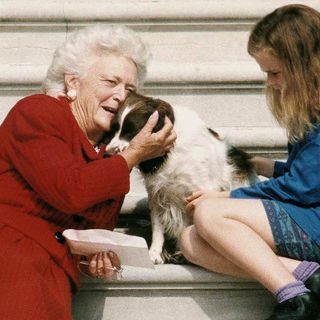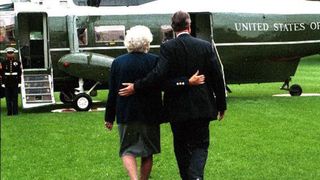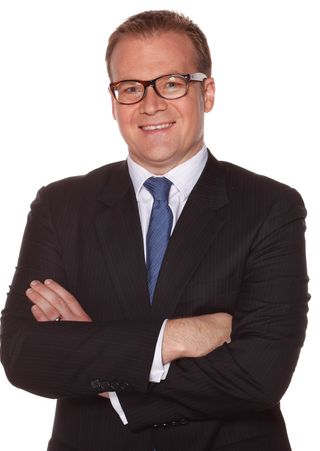George HW Bush may have been the most underrated US president since Harry Truman, and like the haberdasher from Missouri, probably deserves to be elevated in the judgement of history beyond contemporary assessment of his single term.
Like Mr Truman, Mr Bush presided over the end of one kind of war and the emergence of a peace that brought with it a new, uncertain world order — and ultimately, more conflict.
By the time he left office following his defeat in the 1992 election to Bill Clinton, Mr Bush seemed old, tired and out of touch.
It is hard to imagine now, but his failure to recognise a grocery scanner after eight years in the bubble of the vice-presidency was a big deal back then.
Mr Bush presided over the end of one kind of war and the emergence of a peace that brought with it a new, uncertain world order — and ultimately, more conflict.
So was his watch-checking during debates. Nice guy George did not want to exceed his time limit — the unfortunate effect was that he had somewhere he would rather be. Voters were happy to let him go there.
Mr Bush had been one of "the greatest generation" and narrowly avoided beheading at the hands of his Japanese captors after his plane was shot down in the Pacific theatre in 1944.
His chief rival in 1992 was a skirt-chasing, draft-dodging baby boomer from Arkansas who Mr Bush thought morally and ethically unfit to be president.
Yet during that campaign, while Mr Clinton famously felt the voter's pain, Mr Bush simply looked pained.
The athletic, preppy son of a senator, George HW Bush and his sharp-as-a-tack, chain-smoking wife of more than 70 years "Bar" were the darlings of the cocktail set that floated along with the Texas oil industry in the 1960s.
Mr Bush was effortlessly charming, while the future first lady was tough and caustically funny.
They were a formidable partnership in life and politics, and Mr Bush would frequently credit Barbara for whatever successes he achieved.
In early 1991, Mr Bush looked certain to win a second term. His approval rating touched 90 per cent after Saddam Hussein's forces were driven from Kuwait by a US-led coalition. America was leading the world again, as the Berlin Wall was sledge-hammered into rubble and the Soviet Union collapsed just as dramatically.
Barbara Bush was no wimp. In another life, she could've been president

While president Ronald Reagan can take the credit for ratcheting up a space and arms race that helped grind the USSR's economy into the dust and forging a partnership to step back from the nuclear precipice with Mikhail Gorbachev, it was Mr Bush — the former UN ambassador — who brought the Cold War to a close.
Leading Democrats like governor Mario Cuomo of New York and Massachusetts senator Edward Kennedy decided to sit the 1992 presidential race out — Mr Bush was a shoo-in.
The American electorate seldom awards points for foreign policy achievements however, and when the US economy slid into its first recession in a decade, Mr Bush's approval rating plummeted into the 30s.
And as the election year began in 1992, everything seemed to be going wrong.
Mr Bush was challenged for the Republican presidential nomination by a former friend, presidential speechwriter Pat Buchanan, who waged a proto-Trumpian campaign based on nationalism, isolationism and more than a hint of racism.
When Mr Bush suddenly turned as white as a sheet and collapsed, vomiting into the lap of the Japanese prime minister Kiichi Miyazawa during a state banquet in Tokyo, it looked for a few brief moments as though Mr Buchanan may have become the Republican nominee by default.
It turned out to be nothing more serious than a gastric bug, but Mr Bush's political condition was starting to look terminal. Mr Buchanan gained more than 30 per cent of the vote in the first primary in New Hampshire.
Faced with such a challenge, past presidents like Lyndon Johnson had bowed out of the race. Mr Bush hung in there and saw off Mr Buchanan's campaign, but he was badly weakened.
Remarkably, after the passions of that election — which also involved the quixotic third party candidacy of billionaire businessman Ross Perot — Mr Bush and Mr Clinton gradually became friends, and finally more like a deeply affectionate father and son.
Mr Buchanan hammered Mr Bush for breaking his famous "read my lips, no new taxes" pledge at the 1988 Republican Convention, and Republicans ever since have adhered to an anti-tax fundamentalism.
Mr Bush had bent to the will of the Democrat-controlled Congress. The Reagan years had seen massive spending and tax cuts — debt ballooned, and it was time to pick up the tab.
Mr Clinton offered more than empathy, he offered a centrist "third way" — which, while not so very different from Mr Bush's moderate brand of Republicanism, wore its heart on its sleeve.
Mr Clinton's campaign famously stuck to their mantra "it's the economy, stupid", and the voters agreed.
Remarkably, after the passions of that election — which also involved the quixotic third party candidacy of billionaire businessman Ross Perot — Mr Bush and Mr Clinton gradually became friends, and finally more like a deeply affectionate father and son.
Both George and Barbara Bush voted for Hillary Clinton in 2016 over Republican Donald Trump, who they could not abide.
The Bush-Clinton rapprochement across party lines and generations is just one of the reasons why George HW Bush's passing at the great age of 94 feels like the end of a more civilised era in American politics.
May we see his like again.






